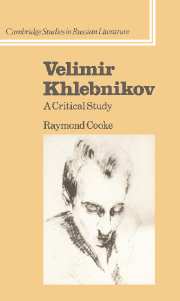Summary
One of the fundamental elements in Khlebnikov's vision of the lost idyll of primitive times is the presence of a universal language. A state of harmony where universal communication meant universal understanding, where ‘words destroyed enmity and made the future transparent and calm’ (SP v 216). Such a universal communication lies at the heart of Khlebnikov's visions of a futuristic Utopia too. Here, the fruits of science and the arts receive instant transmission in the huge ‘shadebooks’ and ‘radio reading rooms’ which adorn the future world's settlements (SP iv 287–95).
Given this, it is somewhat ironic that the dissemination of Khlebnikov's own work has been far from ideal. Not only was the transmission of his work far from instantaneous and universal, but it was also far from accurate. One critic has even suggested that no single other Russian poet has been presented to the reader in such distorted texts.
The distortion which Khlebnikov suffered at the hands of some of his early Futurist editors was certainly considerable. The reproduction of his work abounded in inaccuracies and inconsistencies. As Mayakovsky himself admitted: ‘frequently, the end of one piece was stuck on to the beginning of another’. Unfortunately some of these distortions also found their way into the five-volume edition edited by Stepanov, who was himself not beyond reproach in his editorial work.
Clearly one of the problems (though this can by no means justify all the distortions) was the rather chaotic state of Khlebnikov's manuscripts.
- Type
- Chapter
- Information
- Velimir KhlebnikovA Critical Study, pp. 161 - 183Publisher: Cambridge University PressPrint publication year: 1987

